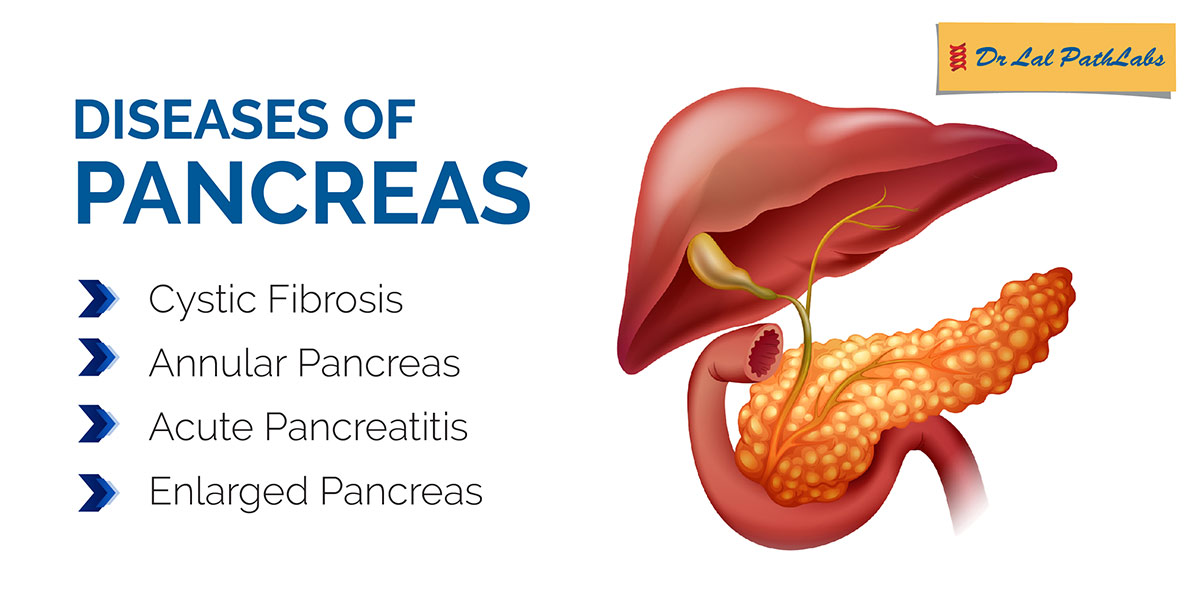Pancreas: Functions, Diseases & Diagnosis
What is Pancreas?
The Pancreas is a solid organ located behind the stomach, across the back of the belly. It is surrounded by other organs such as the liver, spleen, and small intestine.
The Pancreas plays a vital role in converting the food we eat into fuel for the body’s cells. The pancreas has two primary functions, exocrine digestion and endocrine blood sugar regulation. Let us look at various functions of the pancreas in the next section.

What are the functions of the Pancreas?
There are two main pancreas functions.
Exocrine Function:
Exocrine glands present in the pancreas produce enzymes essential to digestion. These enzymes include:
- Trypsin and Chymotrypsin help to digest proteins
- Amylase helps in the digestion of carbohydrates
- Lipase works together with bile to break down fats into fatty acids and cholesterol
Endocrine Function:
The pancreas creates and releases essential hormones directly into the bloodstream. The main pancreatic hormones are
- Insulin acts to lower blood sugar.
- Glucagon acts to raise blood sugar.
- Gastrin stimulates the stomach to make gastric acid.
- Amylin helps control appetite and emptying of the stomach.
Maintaining blood sugar levels is vital for organs such as the brain, liver, and kidneys to function properly.
What are the common diseases of the Pancreas?
The common diseases of the Pancreas include:
- Pancreatitis
- Pancreatic Cancer
- Diabetes
- Weight Loss and Diarrhea: If the pancreas does not produce enough digestive enzymes, it can lead to weight loss and diarrhea.
- Hyperglycemia happens when the body produces too much Glucagon, resulting in high blood sugar levels.
- Hypoglycemia happens when the body produces too much Insulin, resulting in low blood sugar levels.
- Cystic Fibrosis is associated with sticky mucus, which can prevent digestive enzymes from being released into the duodenum.
What are the common symptoms of Pancreas disorders?
Depending on the actual disease, a person may complain of different symptoms.
These symptoms may appear rapidly (acute) or take some time to develop (chronic). However, some common symptoms that could point towards a pancreas disorder include:
- Nausea or Vomiting
- Fever
- Muscle Aches
- Abdominal pain, tenderness, and swelling
- Weight Loss
- Diarrhea
- Jaundice, yellowing of the skin and eyes
- Fatigue
- Greasy stools
- Blurry vision
- Tingling in hands or feet
What are the risk factors of a Pancreatic disorder?
If you have any of the risk factors listed below, you may be more likely to develop pancreatic disease:
- Diabetes
- Liver Problems
- Stomach infections
- Overuse of alcohol
- Obesity
Diagnosis Of Pancreas Disorders
Diagnosing diseases and conditions involving the pancreas is done with a variety of lab and imaging tests, including:
- Blood tests evaluate pancreatic enzymes, liver enzymes, and white blood cell levels, along with kidney function.
- Abdominal Ultrasound
- Angiography
- CT Scan
- ERCP combines Endoscopy and X-rays to evaluate the pancreas and the bile ducts
- MRI Scan focused on the pancreas and bile ducts.
- Fecal Elastase Test measures the elastase levels in the stool. This test is used to detect exocrine pancreatic insufficiency (EPI).
- The secretin pancreatic function test evaluates the response of the pancreas to the secretin hormone.
- Endoscopic ultrasound helps assess inflammation and blockages in the pancreatic or bile duct.
What are the tips for maintaining a healthy Pancreas?
Here are the tips for maintaining a healthy pancreas:
- Quit smoking and avoid secondhand smoke. It can raise your risk of pancreatic cancer and chronic pancreatitis.
- Avoid alcohol.
- Exercise at least 30 minutes a day on most days of the week.
- Achieve and maintain a healthy weight.
- Eat a low-fat diet, as high fat intake can cause pancreatitis.
Disclaimer:
This blog is for informational purposes only and should not be construed as advice or as a substitute for consulting a physician. It is not a substitute for medical advice or treatment from a healthcare professional.













